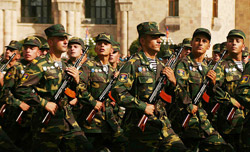The 15th anniversary of the Armenian National Army is, of course, a big, glorious celebration. It had to be celebrated ceremonially and it was. But the ceremonial celebration often ends in itself in Armenia and causes confusion among Armenians.
What precept did we want to pass on to the Armenian society by celebrating the anniversary of the Armenian Army? We have been hearing that the Armenian Army is the most efficient in the South Caucasus region for the past ten years without understanding what we mean by the region-the three republics of the South Caucasus, or Turkey and Iran too?
We have also heard that the Armenian Army is the most organized for a long time too. But it’s not clear as to what we compare it to-the army of the neighboring (rival) country or other fields of Armenian economy. Whatever the case, based on one of the announcements made by the Defense Minister last year, it became clear that the army is racing and winning the other public and state fields of Armenia because there is 80% trust in the army and there is nobody and nothing else in Armenia that has 80% trust.
This could have been something to be proud about if the army wasn’t like the flourished oasis in the desert. I truly don’t want to believe those who come back from the army and tell “fables” about the “dedavshchinas” (elder soldiers), the “watchers of the military unit”, the “officers patronizing the military unit watchers”, “coming on vacation by bribing” and similar things. I also truly don’t want to believe the parents who talk about the material/technical aid provided to their children serving in the military units, including plates, cups, printers, cartridge, even writing paper. I don’t want to believe the “pack of lies” of the former soldiers who say that they haven’t used any weapon during the two years of army service but have stood next to the weapon on the front. I don’t believe that because the testimony of one, two, ten or twenty people is not enough to make judgments about the 60,000 soldiers serving in the army, which is dispersed in a 40,000 square meter territory. One may lie, the other may say bad things, the other may brag, saying that that’s the way the army is. I have a far-away relative who ever since ended his military service in 1968 (he has many grandchildren now), always remembers how he used to hang his belt below the belly in the “military unit” and how his fellow soldiers and officials used to say to him in awe: “Armyan, buri armyan” (What an Armenian, what a strong Armenian).
What can you do? Not only has there been nothing significant since 1968, but also you can’t check to see what happened during the 60s because men “serving in the army” behave themselves however they want and don’t picture life outside of that militarized institution. This is the most serious issue facing Armenia and it puts not only the organizational skills, but also the quality of the army under suspicion. When the soldier from the most efficient and most organized army comes home and works as a waiter or taxi driver just to make some money and “get out of the country”, you realize that the efficiency and organization of the National Army is not conditioned by the correct way of following the demands “get up” and “sleep”, or going to the cafeteria by marching and singing the army song, by serving on-duty for the other soldiers, etc., but rather the lack of meaning of serving in the army for the same young person who serves in the army, or works as a waiter or a taxi driver in the city.
Military service is a civil obligation and logically, the soldier must be the condensed understanding of civility. Based on our perceptions, a soldier is brave, valiant, fearless and daring. These are the adjectives that go before the word “soldier”. But how can one be brave, valiant, fearless and daring in two years and shortly after think about earning some money in order to get a job by bribing? When a twenty-year old boy told me about his plans for the future, I realized that the army is not only a life experience, but it can also be considered as a cooperative university.
Defending the homeland is saint, but how can we understand the young people (mainly the youth living in the distant regions close to the border) who end their two-year conditional military service, come home and not finding a job, return to their conditional service because they pay them well there? They refuse to live among society because of money and become “people with guns”. And that’s exactly what’s being passed on to Armenian society in these days as we celebrate the 15th anniversary of the formation of our army. Billboards can be seen on all streets and squares and the words remind you of an arms race.
“My weapon is my song”-Shushan Petrosyan. “My weapon is your smile”-Hrant Tokhatyan. “My weapon is my art”-Armen Jigarkhanyan. “My weapon is my stage”-Vladimir Msryan. “My weapon is your health”-Ara Babloyan. “My weapon is my fist”-Vic Darchinyan. “Our weapon is our minds”-a group of Armenian chess players. “My weapon is my music”-Armen Martirosyan. “My weapon is my melody”-Jivan Gasparyan and finally “Our weapon is our faith”-Archbishop Navasard Kchoyan.
You read the billboards and don’t understand why there are so many armed people in a city where there is two-digit economic growth, where Euro buildings are built, where cafes and bars are full of people who have fulfilled their civil obligation and are standing in the only oasis of Armenian life with their weapons.

